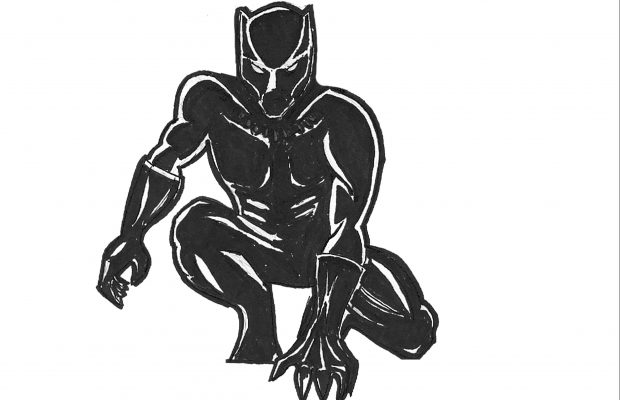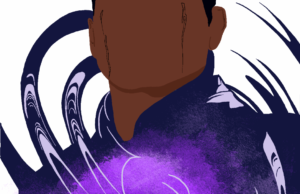Black Panther claws its way into theaters

Black Panther is the newest addition to the Marvel Cinematic Universe (MCU), a universe that seems to be growing by the day. It follows the events of Captain America: Civil War, after the death of the former King T’Chaka (John Kani). Now his son, T’Challa (Chadwick Boseman), must fight for his right to be king of Wakanda. Once he gains the position, he is immediately plagued by a terrible burden– his country is teeming with resources and technology that could save the world, but to help the rest of the world would sacrifice his country’s culture and security.
All the meanwhile, T’Challa is also looking to avenge his father’s death, a goal carried over from Captain America: Civil War that was left unresolved. Dealing with his family’s dark past, T’Challa must deal with betrayal and international diplomacy to learn to be a good king for his people and the world.
With an almost entirely black cast and a black director, Ryan Coogler, the movie made itself stand out from the whitewashed films that have continued to be popular, even into 2018. The movie dealt with real issues regarding ethnicity and did so with grace and conciseness.
The film also did a very nice job giving strong and powerful leads to women. With the general of the Wakandan army, Okoye (Danai Gurira), as well as all the rest of the royal army played by women, it was a refreshing change to the primarily male MCU.
The movie’s soundtrack was nothing short of fantastic. Heavily relying on drums and woodwind instruments, the music was full of emotion and tension that helped to drive the plot of the film.
However, the plot of the film itself, although fine, was just that — fine. It contained a few minor plot twists, but I found everything a bit too predictable. After his appearance in Captain America, I had hoped that Marvel would develop the character of T’Challa a bit more that it had been, but I did not really feel that they added much we did not already know.
The plot relied heavily on the audience already being committed to the MCU, rather than pulling in new audience members. The entire plot of the movie was based on the death of King T’Chaka, which happened in the third Captain America film. Although the movie was able to stand alone as far as Marvel films go, I felt that it expected the audience to already have the context for the character’s motivations.
This being said, the plot did have redeeming factors, such as learning more about Wakanda’s political standing and more about King T’Chaka. The movie had great action scenes and the advance technology portrayed in the movie was exquisitely fascinating. I particularly enjoyed learning more about the various qualities of Marvel’s all-powerful metal, vibranium, upon which Wakanda holds its fortune and Cap holds his shield.
And, of course, the end credit scenes– while the first one was essentially just a continuation of the plot, the second end credit scene was well worth the wait through the ever-ongoing list of credits– but no spoilers!
All in all, I found Black Panther to be riveting and thought-provoking. I would recommend this film, even to those who have not seen its predecessors, as it does have enough information to stand on its own. This film was a great rendition of Black Panther, and I am excited for his return in the upcoming Infinity War movie. 7/10



